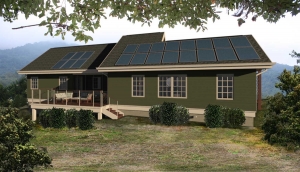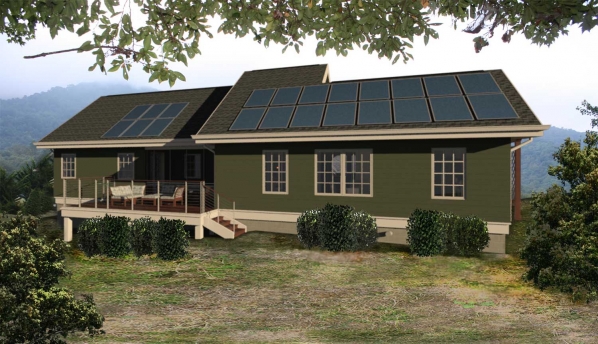Team Appalachian [In]sight, a group of seven graduate and undergraduate students representing Appalachian State University’s Department of Sustainable Technology and the Built Environment, placed second in the “Suburban Single-Family Housing” category at the fourth annual Race to Zero Competition. The event, sponsored by the U.S. Department of Energy (DOE), was held at the National Renewable Energy Lab in Golden, Colorado April 22-23.
After months of designing, evaluating, computer modeling, reporting and preparation, the team presented their design for a suburban single-family detached house to a panel of national experts comprised of architects, builders and scientists, among others. This is the third year an Appalachian State University team has placed in the competition, which is designed to challenge students to think creatively and propose new solutions to real-world problems.
“The judges were impressed with the innovative solutions that our team proposed for several problems in building design and construction,” said Assistant Professor of Building Sciences Andrew Windham, who led the student team. “A few of those innovations merit additional testing and development because they have a chance to alter construction on a large scale, which is exciting.”
According to the Office of Energy Efficiency & Renewable Energy’s website, students were tasked with creating a new house design or redesigning an existing floorplan to meet the competition's cost-effective, high-performance home energy requirements. The teams are encouraged to focus on developing cost-effective, market-ready, zero-energy homes.
Appalachian’s team included Hazel Chang, a technology graduate student from Kuala Lumpur, Malaysia; Ethan Gooch, a senior building sciences major from Kernersville; Rowan Parris, a senior building sciences major from Mooresville; Abe Somers, a technology graduate student from Greensboro; Ricky Bohlen, a senior appropriate technology major from Charlotte; Bahar Shirkhanloo, a technology graduate student from Tehran, Iran; and Andrew Mackenzie, a senior sustainable technology major from Ashburton, New Zealand.
Thirty-nine teams representing 33 schools around the country participated in this year’s Race to Zero, including Vanderbilt University, Penn State, Syracuse University, Virginia Tech and Purdue, among others.
About the U.S. Department of Energy (DOE) Race to Zero Student Design Competition
As part of DOE’s Building America and Zero Energy Ready Home programs, the Race to Zero was designed to advance and enhance building science curriculum in universities. The competition inspires collegiate students to become the next generation of building science professionals through a design challenge for zero energy ready homes. Students become part of a new leadership movement to achieve truly sustainable homes. Through Race to Zero, future architects, engineers, construction managers and entrepreneurs will gain the skills and experience to start careers in clean energy and generate creative solutions to real-world problems.
About the Department of Sustainable Technology and the Built Environment
One of seven departments housed in the College of Fine and Applied Arts, the Department of Sustainable Technology and the Built Environment at Appalachian State University features an integrated array of programs spanning the fields of sustainable design and technology. Its mission is to foster a strong and vibrant culture of inquiry, discovery and innovation that integrates theory with application, problem seeking with problem-solving, local issues with global perspectives and technological progress with environmental stewardship. It offers bachelor’s degrees in sustainable technology and building science, and a master’s degree in technology.
About Appalachian State University
Appalachian State University, in North Carolina’s Blue Ridge Mountains, prepares students to lead purposeful lives as global citizens who understand and engage their responsibilities in creating a sustainable future for all. The transformational Appalachian experience promotes a spirit of inclusion that brings people together in inspiring ways to acquire and create knowledge, to grow holistically, to act with passion and determination, and embrace diversity and difference. As one of 17 campuses in the University of North Carolina system, Appalachian enrolls about 18,000 students, has a low student-to-faculty ratio and offers more than 150 undergraduate and graduate majors.

